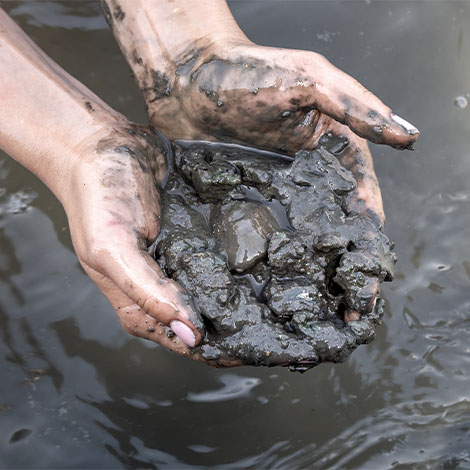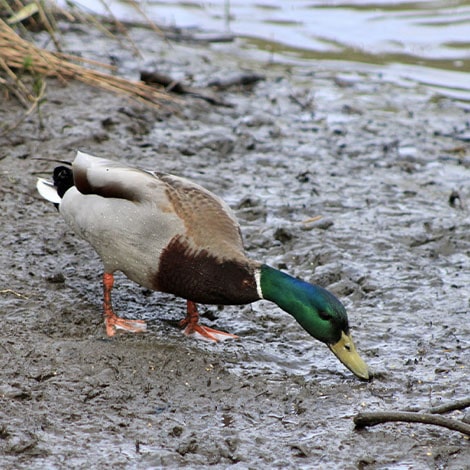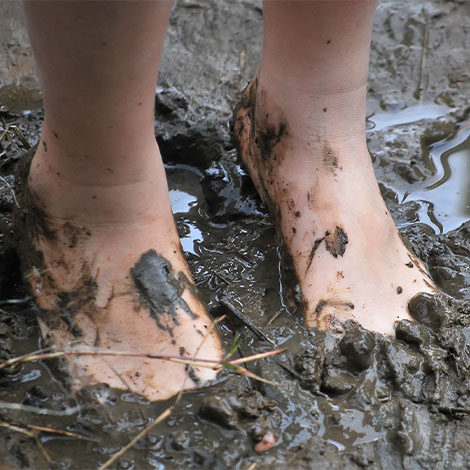We've experienced the squishy, sometimes smelly sensation of muck between our toes, but have you ever wondered, what exactly is pond muck?
What is Muck?
Muck is made up of plant and animal waste. It is caused by dying and decaying organics. If you feed your fish, any uneaten fish food will end up decaying at the bottom of the pond. Remember, feeding fish too much or using a low-quality food will increase the amount of fish waste, adding to that muck layer. Other animals, such as ducks and geese, add their waste to the muck as well.
Even without fish or other animals, dead algae and weeds, twigs, grass clippings, and leaves naturally contribute to the accumulation of muck. It is always a good idea to prevent organics from entering the pond and to remove as much as possible. Over time, with layers of leaves and other debris building up, the sludge can build to be inches or more thick.
What is Muck's Purpose?
Muck undoubtedly is a food source. "A food source for what?" you may ask. Muck contains high levels of nutrients that feed algae and aquatic weeds. As the muck layer grows, so will your problems with these aquatic nuisances. Muck can also be a breeding ground for leeches as they love to grow and burrow in the muck.
Why is Muck Stinky?
Muck tends to have a rotten egg smell to it. Those odors are common in ponds that are not aerated, particularly during certain times of the year. In the summer and winter, non-aerated ponds stratify into layers of water with distinct temperature differences. While the water is stratified, the oxygen in the lower portion of the pond is used up quickly.
This causes it to go from an aerobic environment (an oxygen-rich environment) to an anaerobic environment (a low-oxygen environment) – which is perfect for slow-moving anaerobic bacteria that use enzymes to ferment and digest the decaying muck on the bottom. Those microorganisms ultimately produce waste products, including carbon dioxide and hydrogen sulfide, which is that unpleasant rotten egg smell.
In the spring and during strong weather events, the water column turns over; the anaerobic layers on the bottom rise to the top, bringing with it all those foul-smelling odors. Melting ice releasing all those gases at once can help make a big stink!
Pond Life Cycle
Understanding a pond's life cycle will help to better understand when and how muck plays its part. From small ponds to large lakes, all water bodies encompass an ever changing ecosystem struggling to find balance. To help you better understand the life cycle of your pond, we'll break down the process into two basic stages:
Stage 1 – A freshly dug pond is free from weed and debris caused by wildlife, waste, plant decay, and other organic material. The water is generally clean and clear and there is minimal algae and weed growth. New ponds typically remain in Stage 1 for 3 – 5 years.
Stage 2 – Over time organic debris begins to accumulate and the pond becomes overabundant with nutrients. These excess nutrients become an effective plant fertilizer, causing weeds and algae to grow prolifically. You may begin to notice emergent weeds, like cattails and shoreline grasses, growing along the shoreline and a foul smell emanating from the water.
Pond owners tend to use reactive treatments like aquatic herbicides and algaecides during this stage to kill existing growth. These reactive treatments provide a temporary fix to weed and algae control. If left in the pond, the decaying plant material turns into nutrient-rich pond muck that continues to fuel weed and algae growth.
The pond then enters a continuous cycle of reactive treatments, leaving you, the pond owner, to use chemicals to control growth. A pond at this point is said to be eutrophic or teeming with enough excess debris to support algae and weed growth.
How to Clean Muck From Bottom of Pond
While muck is a part of a pond’s life cycle, there are steps you can take to remove pond and lake muck. Adding Aeration and beneficial bacteria, such as MuckAway, can be used to reduce current muck and prevent build up. If you’re looking for a complete system to a clear pond without the muck, try the Airmax ClearPAC Plus.
Read More Related Articles
Pond & Lake Muck Removal
How to Reclaim Your Lakefront Shoreline
Muck Reduction Study With MuckAway
MuckAway Outperforms Competitor Muck Reducers
Last Updated: December 5, 2023


